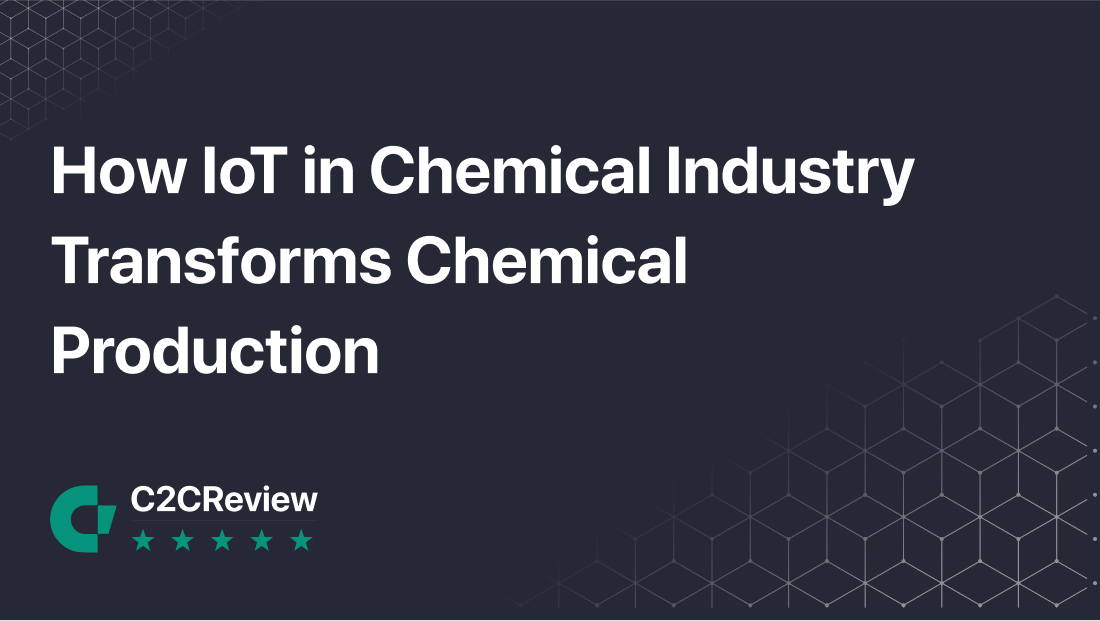
How IoT in Chemical Industry Transforms Chemical Production

25May
The chemical industry, like many other sectors, is currently facing numerous challenges in the present and future. Alongside the ongoing recovery from the pandemic that affects all industries, chemical organisations are actively seeking improved strategies and operations as part of a broader reevaluation of business practices. Here comes the IoT in chemical industry which has brought a notable shift in this sector in terms of manufacturing and production.
With this transformation, there is a growing focus on the environment, which is influencing how companies approach customer demand and changing costs. Digital transformation in chemical industry is emerging as a powerful catalyst for positive and big changes in this landscape. Advanced technologies, especially the Internet of Things (IoT), are driving innovation and leading to improved plant operations, increased efficiency, and greater environmental awareness. Therefore, the chemical industry is going through a transformation for several significant reasons.
Where IoT Fits in Chemical Industry
The Internet of Things (IoT) is driving digital transformation across industries, and its impact on the chemical industry is powerful which leads to substantial changes in innovation, regulations, and production strategies.
The integration of IoT into core operations is enabling chemical companies to enhance their offerings. IoT is useful for monitoring various aspects, including production line devices and the training of professionals, leading to improved accuracy and closer tracking of critical elements of the job.
Firstly, the chemical industry is dynamically adapting to evolving environmental and business changes in real time. Introducing new regulations to mitigate the environmental impact of chemical production is a positive development. However, these changes also introduce complexities to conventional practices, where IoT play a crucial role.
The IoT can transform chemical production to embrace innovation while simultaneously enhancing operational procedures. According to Markets and Markets, investments in the IoT within the chemical industry are projected to reach nearly $80 billion by 2024, which explains the transformative impact of IoT on industry-leading companies.
With IoT-based operations for core chemical processes, businesses can allocate their human capital to more strategic tasks. This increased dependency on applications of IoT in chemical industry also enables a comprehensive analysis of equipment performance in terms of both efficiency and environmental impact.
Key Benefits of IoT in Chemical Industry
Efficient Monitoring
It provides a digital representation of plant operations and the entire supply chain, enabling manufacturers to identify and address underperforming equipment, rapidly detect and track quality issues, and monitor the chemical process from raw materials to the final product.
Real-Time Information
IoT offers real-time status updates on objects. For instance, instead of manually checking equipment for anomalies and pasting data on a clipboard, operators can now send that information to the cloud. It can then be analysed based on similar inspections and compared against data from sensors, providing a detailed view of equipment health for that specific asset type. Hence, IoT enables automatic and instant insights into the plant at a lower cost.
Predictive Maintenace
IoT offers prescriptive advice.
The IoT-based software can analyse production process trends and equipment performance to recommend actions that align with the organization's business objectives. These recommendations go beyond simple equipment shutdowns or process adjustments. Companies can leverage IoT for chemical industry solutions to make informed decisions regarding equipment replacement versus repair, identify unnecessary and costly maintenance and inspection tasks, and determine the most energy-efficient production processes.
Health and Safety Monitoring of Workers
Chemical companies consistently invest billions of dollars each year to enhance the well-being and security of their workers. By leveraging IoT technology, chemical plants can further advance worker safety and significantly reduce emergency response times.
When employees carry wearable devices designed for hazardous environments such as chemical facilities, they have a reliable means of communication with their colleagues and supervisors throughout their workday. Such constant connectivity allows them to promptly reach out for assistance in case of any health concerns or other problems they may encounter. By leveraging cloud-connected teams, valuable information can be shared, which can prove crucial in both emergency situations and day-to-day work situations. This information can maintain good health, prevent illnesses, and save lives.
The use of wearable ensures continuous communication but also facilitates real-time data management. When workers have quick access to digital handbooks and instructions, they are more likely to perform tasks using appropriate safety techniques and adhere to safety protocols. Moreover, tablet users can engage in video chats with experts who are located offsite. It enables them to receive guidance on the correct operation of equipment and other processes, ensuring optimal performance and safety.
Know More about Customers
The chemical industry is an asset-intensive sector which primarily focused on optimising plant and asset operations. However, there is high potential for the industry to develop innovative and customer-centric business models and services. Here’s how chemical companies can benefit from effectively leveraging IoT at the customer front end:
Implementing Vendor/Supplier Managed Inventory concepts and automating the replenishment process through sensors. It enables a "no" or "low touch" order-to-delivery system.
Real-time monitoring of customers' manufacturing process parameters using sensor technology and leveraging advanced algorithms to correlate these parameters with the quality of (semi-) finished products. It opens up the opportunity to offer first-pass quality as a business outcome rather than just selling products. In addition, chemical companies can provide benchmark data as a service.
Utilising advanced algorithms to gain a better understanding of customers' buying behaviour and patterns. Such information can then be used to adjust the product and service portfolio accordingly, identify cross-selling opportunities, and increase customer loyalty and share of wallet.
Collecting and processing unstructured data from social media to gain visibility into customer/market sentiment. By analysing this data, chemical companies can respond with appropriate marketing campaigns and innovative service offerings that align with customer needs and preferences.
Conclusion
In the near future, the chemical industry will experience a significant revolution with the advent of the Internet of Things (IoT). The IoT in chemical industry plays a crucial role in identifying, measuring, and tracking various parameters that contribute to worker safety and prevent machine failures. By leveraging IoT applications, chemical manufacturing companies will be able to streamline their operations and facilitate strategic growth. Furthermore, businesses will have the capability to monitor and analyse the consumption of energy and other utilities in critical processes, leading to operational cost savings.
Related Post

Unlocking Success: 7 Secrets of Mobile App Development That Every Entrepreneur Should Know
Introduction: The.com Gold Rush For Mobile Apps The world’s obsess....

Unlocking Success: 7 Secrets of Mobile App Development That Every Entrepreneur Should Know
Introduction: The.com Gold Rush For Mobile Apps The world’s obsess....

Small Businesses Embrace AI - 82% Expect Major Changes
Introduction As we enter a new era of technological innovation, small compani....
Vahe Hakobyan
Aug 13,2025
Very detailed and in-depth content issuu
Jul 30,2025
May 20,2025
May 04,2025
Apr 29,2025
Apr 24,2025
Apr 20,2025
Apr 16,2025
Apr 12,2025
Apr 08,2025
Apr 02,2025
Mar 26,2025
Mar 19,2025
Mar 16,2025
Mar 15,2025
Mar 07,2025
Mar 06,2025
Feb 25,2025
Feb 17,2025
Feb 12,2025
Feb 12,2025
Feb 11,2025
Feb 10,2025
Feb 09,2025
Feb 08,2025
Feb 06,2025
Jan 24,2025
Jan 02,2025
Nov 18,2024
Oct 06,2024
Sep 17,2024
Aug 30,2024
Jun 23,2024
Jun 05,2024
Jun 04,2024
Apr 13,2024
Mar 20,2024
Nov 22,2023
Sep 19,2023
Jul 16,2023